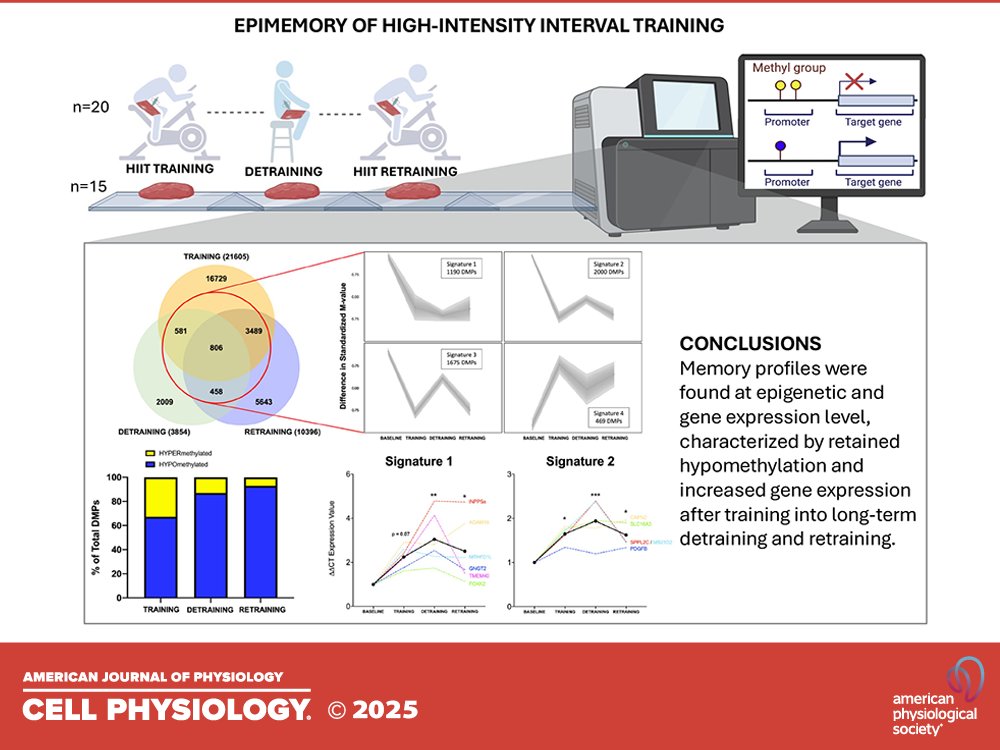[GUEST ACCESS MODE: Data is scrambled or limited to provide examples. Make requests using your API key to unlock full data. Check https://lunarcrush.ai/auth for authentication information.]  Brady Holmer [@B_Holmer](/creator/twitter/B_Holmer) on x 25.2K followers Created: 2025-07-18 19:41:01 UTC Does our body have "muscle memory" for endurance adaptations? A fascinating study in the Journal of Applied Physiology explored this concept Researchers examined XX young adults who underwent an eight-week high-intensity interval training (HIIT) program on stationary bikes, consisting of three sessions per week with intense intervals. Following this, participants took a three-month detraining period before repeating the eight-week training regimen. VO₂ max improved to the same extent in both training phases. However, the real finding lies in the skeletal muscle's epigenetic memory. Even after three months off, thousands of DNA sites remained hypomethylated (in an active state). This persistence affected key genes, such as SLC16A3 involved in lactate transport and CAPN2 for calcium signaling, which maintained lower methylation and higher expression levels. As a result, the muscles adapted more readily upon retraining. In essence, your muscles appear to "remember" endurance training at a molecular level, making it easier to bounce back after time away. It also (probably) explains why someone who was "once a runner" can return to the sport somewhat easily compared to someone who's never run seriously.  XXXXXX engagements  **Related Topics** [$brc](/topic/$brc) [Post Link](https://x.com/B_Holmer/status/1946294155275338233)
[GUEST ACCESS MODE: Data is scrambled or limited to provide examples. Make requests using your API key to unlock full data. Check https://lunarcrush.ai/auth for authentication information.]
 Brady Holmer @B_Holmer on x 25.2K followers
Created: 2025-07-18 19:41:01 UTC
Brady Holmer @B_Holmer on x 25.2K followers
Created: 2025-07-18 19:41:01 UTC
Does our body have "muscle memory" for endurance adaptations?
A fascinating study in the Journal of Applied Physiology explored this concept
Researchers examined XX young adults who underwent an eight-week high-intensity interval training (HIIT) program on stationary bikes, consisting of three sessions per week with intense intervals. Following this, participants took a three-month detraining period before repeating the eight-week training regimen.
VO₂ max improved to the same extent in both training phases. However, the real finding lies in the skeletal muscle's epigenetic memory.
Even after three months off, thousands of DNA sites remained hypomethylated (in an active state). This persistence affected key genes, such as SLC16A3 involved in lactate transport and CAPN2 for calcium signaling, which maintained lower methylation and higher expression levels. As a result, the muscles adapted more readily upon retraining.
In essence, your muscles appear to "remember" endurance training at a molecular level, making it easier to bounce back after time away.
It also (probably) explains why someone who was "once a runner" can return to the sport somewhat easily compared to someone who's never run seriously.

XXXXXX engagements
Related Topics $brc